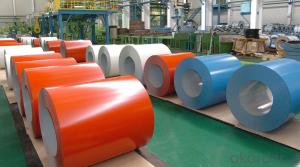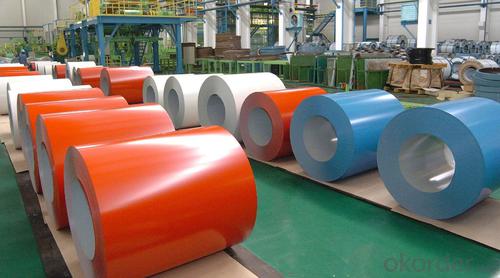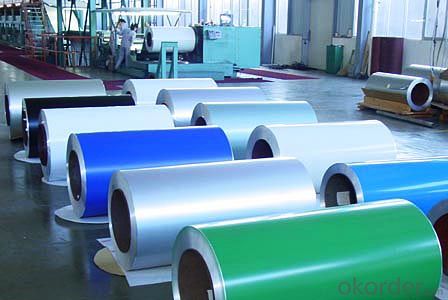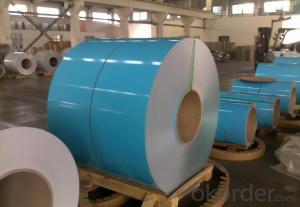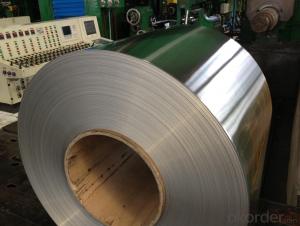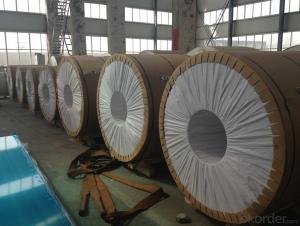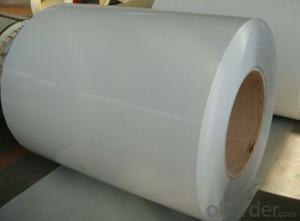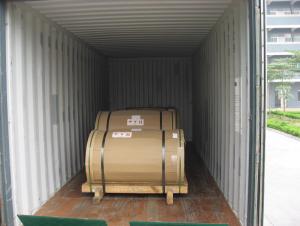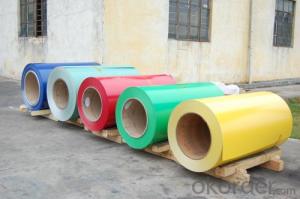Aluminum Coils for Sale - Aluminium for Glass Wall Prepainted Coil
- Loading Port:
- Shanghai
- Payment Terms:
- TT OR LC
- Min Order Qty:
- 5 m.t.
- Supply Capability:
- 2000 m.t./month
OKorder Service Pledge
OKorder Financial Service
You Might Also Like
Specification
Structure of Aluminium for Glass Wall Prepainted Coil Description:
Coated aluminum coil/sheet are of a wide range of colors, which gives wonderful appearance no matter in residential and commercial constructions of great exhibition centers.
The coated aluminum coil/sheet have been widely used in the fields of construction and decoration( garage doors, ceiling etc.), electronic appliances, lighting decoration, air-condition air pipes, sandwich panels and drainages etc.
Main Features of the Aluminium for Glass Wall Prepainted Coil:
1) High flexibility
2) Impact resistance
3) Excellent weather-proof durability
4) Anti-ultraviolet
5) High erosion resist
Images of the Aluminium for Glass Wall Prepainted Coil:
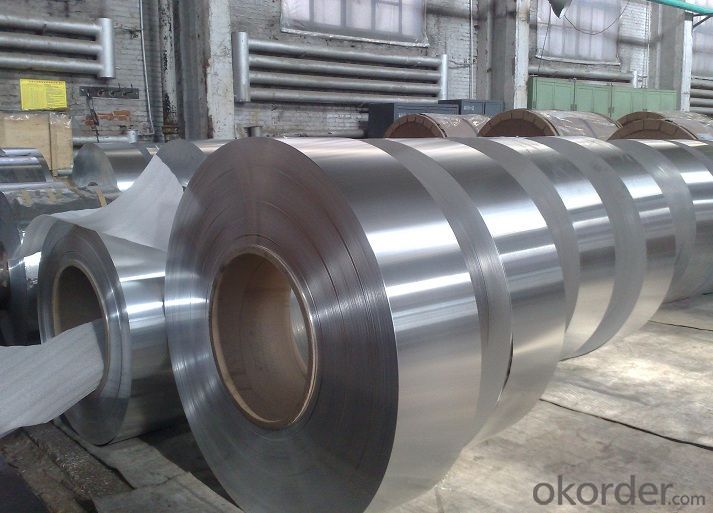
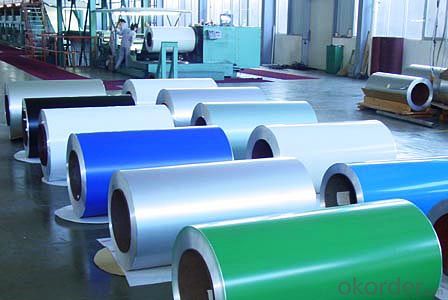
Aluminium for Glass Wall Prepainted Coil Specification:
Alloy | A1100,A3003,A1050,A8011 etc |
Temper | H16,H18,H24 |
Thickness | From 0.024mm to 1.2mm |
Width | Standard width:1240mm |
Special width:1300mm,1520mm,1570mm,1595mm | |
Diameter | Standard dia:1200mm |
Interior dia:150mm,405mm,505mm | |
Weight | 2.5 T/coil,3.0 T/coil |
Coating | PE, PVDF, AC |
Surface | Embossed, mill finish, coated |
Color | AS to code RAL |
Gloss | 10-90%(EN ISO-2813:1994) |
Coating Thickness | PE: more than 18 micron |
PVDF: more than 25 micron | |
Coating Hardness (pencil resistance) | More than 2h |
Coating adhesion | 5J(EN ISO-2409:1994) |
Impact Resistance | No peeling or cracking(50 kg/cm,ASTMD-2794:1993) |
Flexibility (T-bend) | 2T |
MEK resistance | More than 100 |
FAQ:
a.What is monthly capacity
---CNBM is one stated own company and our monthly capacity is about 2000tons.
b. Now which countries do you export your goods?
---Now we export to South East Asia,Africa, North America,South America ect.
- Q: How are aluminum coils coated for color matching and aesthetic purposes?
- Aluminum coils are coated for color matching and aesthetic purposes through a process called coil coating. During this process, a layer of paint or coating material is applied to the aluminum coil. The coil is first cleaned and treated to ensure proper adhesion of the coating. Then, a primer is applied to improve corrosion resistance. Finally, a topcoat is added to achieve the desired color and aesthetics. This process ensures that the aluminum coils have a consistent color and finish, making them suitable for various applications such as building facades, automotive parts, and appliances.
- Q: How are aluminum coils cut to size?
- Aluminum coils are typically cut to size using specialized coil slitting machines. These machines have rotating circular blades that make precise cuts along the length of the coil. The coil is fed through the machine, and the blades cut the aluminum into the desired width. The cut pieces are then collected and further processed or used for various applications.
- Q: Is it possible to utilize aluminum coil in the welding process?
- <p>Yes, aluminum coil can be used for welding. It is commonly used as a filler material in processes like MIG (Metal Inert Gas) welding, where it is fed continuously into the weld pool to create a joint. Aluminum welding requires specific techniques and equipment due to its high thermal conductivity and the need to prevent oxidation. The aluminum coil must be of high quality and clean to ensure a strong, corrosion-resistant weld.</p>
- Q: Can aluminum coils be used in chemical processing plants?
- Indeed, chemical processing plants can utilize aluminum coils. Aluminum, a versatile and extensively employed substance across multiple industries, including chemical processing, boasts exceptional resistance to corrosion. Consequently, it proves apt for the manipulation and conveyance of diverse chemicals. The application of aluminum coils extends to heat exchangers, condensers, evaporators, and other chemical processing equipment. Moreover, aluminum coils boast a lightweight nature and exhibit high thermal conductivity, promoting efficient heat transfer and energy conservation. Nevertheless, it remains crucial to carefully evaluate the specific demands and compatibility of the chemicals being processed to ascertain the suitability of aluminum coils for the intended use.
- Q: Can aluminum coils be used in the manufacturing of electronic devices?
- Yes, aluminum coils can be used in the manufacturing of electronic devices. Aluminum has excellent electrical conductivity and thermal properties, making it suitable for various applications in electronics, such as in transformers, inductors, and heat sinks. Its lightweight nature and corrosion resistance also make it a popular choice for electronic components.
- Q: Are aluminum coils suitable for marine applications?
- Indeed, aluminum coils prove to be fitting for marine applications. As a material resistant to corrosion, aluminum becomes an ideal option for deployment in marine settings that often encounter saltwater and other forms of corrosive elements. Lightweight, long-lasting, and boasting a high strength-to-weight ratio, aluminum coils hold significance in marine applications where weight reduction is sought after. Moreover, aluminum coils exhibit resilience in the face of extreme temperatures and possess commendable thermal conductivity, rendering them suitable for diverse marine heating and cooling systems. In summary, aluminum coils enjoy popularity in marine applications owing to their corrosion resistance, durability, and lightweight attributes.
- Q: I have aluminum windows that have to be replaced due to bad thermopanes - there is accumulated grime and humidity in between the panes. Is it possible to buy individual custom-sized replacements or do I have to get all new windows and frames? Any referrals would be helpful.
- I just got mine done by Home Depot this past summer. They (and other home improvement stores and contractors) will replace as many or as few windows as you want. They will have to remove the old frames because the newer windows are deeper than the old aluminum ones (knucklebusters, my mother calls them). When you get them done, keep in mind that you can get up to a $1500 dollar tax rebate on home improvements (30% of your cost up to $1500) through 201 as long as the windows you get are within the existing guidelines for energy efficiency. Whatever vendor you go to will tell you what available options you have with them to qualify for the rebate.
- Q: What are cold rolled aluminum coils and hot rolled aluminium coils, what are their respective features?
- Each has its advantages and disadvantages.Cold rolling mainly deals with non thermal strengthening of sheet metal. Generally, the surface requirement is relatively high, and the ultra-thin materials such as single zero foil, double zero foil and so on can only be rolled by cold rolling.
- Q: for purchasing aluminium are the grades to be mentioned
- Aluminum alloy designations are described by a 4-digit index system. The first digit indicates the alloy group according to the major alloying elements. 1XXX - 99% Al with no major alloying element. 2XXX – copper 3XXX – Manganese 4XXX – Silicon 5XXX – Magnesium and silicon 7XXX – Zinc 8XXX – other element Experimental alloy designations have an “X” prefix Aluminum temper designations (suffixes) describe heat-treatable and non heat-treatable alloys.
- Q: What are the common international standards and certifications for aluminum coils?
- There are several common international standards and certifications for aluminum coils that ensure their quality and compliance with industry requirements. These standards and certifications include: 1. International Organization for Standardization (ISO): ISO 9001 is a globally recognized standard for quality management systems. It ensures that the manufacturer has implemented effective quality control processes throughout their production and supply chain, resulting in consistent and reliable aluminum coils. 2. American Society for Testing and Materials (ASTM): ASTM International develops and publishes technical standards for various materials, including aluminum coils. ASTM B209 is a commonly referenced standard for aluminum and aluminum-alloy sheet and plate, which covers the general requirements for flat-rolled aluminum products. 3. European Norms (EN): EN 485 is a European standard that specifies the mechanical properties, dimensions, and tolerances of aluminum and aluminum alloys. It ensures that the aluminum coils manufactured in Europe comply with the specified quality and performance requirements. 4. Japan Industrial Standards (JIS): JIS H 4000 is a set of standards developed by the Japanese Industrial Standards Committee for aluminum and aluminum alloys. It covers the chemical composition, mechanical properties, and dimensions of aluminum coils, ensuring their suitability for various applications. 5. Aluminium Stewardship Initiative (ASI) Certification: ASI is a global, multi-stakeholder initiative that promotes responsible production, sourcing, and stewardship of aluminum. The ASI Certification ensures that aluminum coil manufacturers follow strict environmental, social, and governance standards, including responsible sourcing of raw materials and sustainable production practices. 6. United States Aluminum Association Certification: The Aluminum Association is a trade association in the United States that represents the aluminum industry. Their certification programs, such as the Aluminum Transportation Group (ATG) Certification, ensure that aluminum coils meet the industry's specific requirements for automotive, aerospace, and other transportation applications. These standards and certifications provide assurance to customers that the aluminum coils they are purchasing meet the necessary quality, performance, and sustainability standards. It is important for manufacturers and suppliers to adhere to these international standards to gain credibility and maintain the trust of their customers in the global market.
Send your message to us
Aluminum Coils for Sale - Aluminium for Glass Wall Prepainted Coil
- Loading Port:
- Shanghai
- Payment Terms:
- TT OR LC
- Min Order Qty:
- 5 m.t.
- Supply Capability:
- 2000 m.t./month
OKorder Service Pledge
OKorder Financial Service
Similar products
Hot products
Hot Searches
Related keywords
